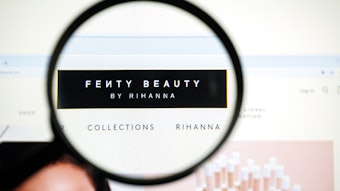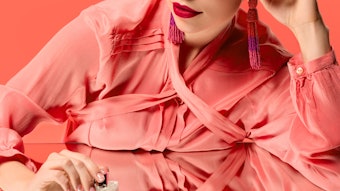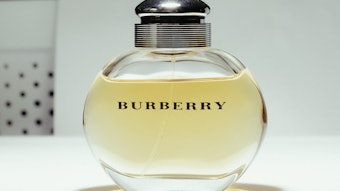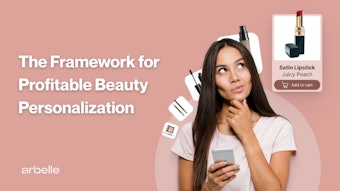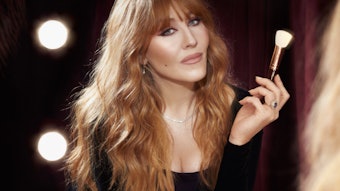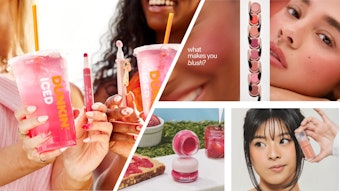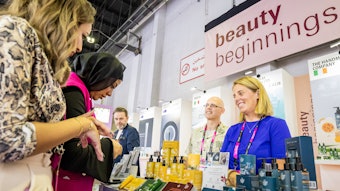
How big are the global cosmetics markets? See Euromonitor's exclusive data above to find out. But what's creating the growth? According to industry experts, ethical brands, "fundamental consumer interest in the category," multifunctional products and a steady flow of cash from investors continue to keep this category dynamic.
Ethical Color
Green, clean, ethical beauty is on the rise, driving the expansion of retailers like Credo and reshaping the product mixes of others, including Bluemercury. According to a Euromonitor analysis, consumers are more concerned about the natural/organic status and environmental and ethical records of their skin care and hair care products, compared to color cosmetics. But that doesn’t mean makeup is off the hook.
Kristin Adams founded Afterglow Cosmetics during the early rise of ethical, clean and green beauty, and understands the frustrations of consumers, including cancer survivors, who have had trouble finding alternatives to conventional beauty products.
From animal welfare to waste reduction to water efficiency and beyond, consumers in every category are increasingly focused on the impact of their product purchases. The market is already filled with natural-touting brands (Milk Makeup Sunshine Skin Tint SPF 30, Tarte Tarteist Lip Crayon, Bite Beauty’s The Lip Pencil, etc.) and vegan offerings (Tarte Double Duty Beauty Shape Tape Contour Concealer, BH Cosmetics Carli Bybel 14 Color Eyeshadow & Highlighter Palette, Pacifica Devocean Lipstick, etc.).
Ethical Beauty Early Adopter
Kristin Adams founded Afterglow Cosmetics during the early rise of ethical, clean and green beauty, and understands the frustrations of consumers, including cancer survivors, who have had trouble finding alternatives to conventional beauty products. Leveraging resources such as the Campaign for Safe Cosmetics and Environmental Working Group’s toxicity database, Adams was able to educate herself on viable ingredient and product swaps.
Adams told Global Cosmetic Industry that her brand is transparent about the ingredient content of its products, including ethical sourcing, the limits of natural and organic sourcing, as well as labels such as Leaping Bunny and emerging ethical issues such as the use of mined minerals.
Focusing on truthfulness boosted Afterglow Cosmetics’ direct-to-consumer online market approach, which allowed the brand to find its well-educated niche consumers. These consumers, who range in age from their 20s to their 60s, are interested in sustainability and don’t necessarily chase every trend, Adams explained.
Nearly 40% of Asia Pacific beauty product launches featured an anti-pollution claim.
These consumers are focused on their health and wellness and are understanding about the relatively short shelf lives of natural products. And, because many of the brand’s formulations incorporate ingredients such as jojoba and grapeseed extract, they boast a built-in skin care component.
Afterglow’s pricepoints and natural focus appealed to salons and spas, as well as dermatologist and even chiropractic offices, where detoxing practices are often highlighted. While the core of the business remains direct-to-consumer, Afterglow remains focused on the human, tactile elements of the brand, including an open container return policy. The next move for the brand is to enhance the sustainability of its packaging, including its refillable palette.
Adams reflected that many mainstream brands are now getting into the natural and ethical beauty space, which has pushed Afterglow to define itself in a crowded market. At the same time, she said, formulations are getting progressively better as the quality of ingredients for natural and ethical products continues to improve.
Color Defense
Ingredient suppliers have taken the lead in anti-pollution, with innovations such as Lipoid Kosmetik’s HerbaShield URB, a COSMOS-certified botanical active comprising watercress, horsetail and nettle extracts that provides protection for skin against urban pollution; Indena’s Vitachelox botanical compounds, which act as anti-pollutants, skin protectors, free-radical scavengers and chelating agents; and Greentech’s forthcoming ingredient, which will fight against biological damages caused by pollution, providing long-lasting, breathable protection for skin that restores balance, radiance and a smooth texture.
Wellness is generating new ways to engage the consumer, he said, which in turn creates greater acquisition interest from larger corporate players.
Anti-pollution claims are rife in the skin, sun and hair care sector, according to a Euromonitor analysis, but color is gaining momentum. Brands touting anti-pollution activities include Clinique Super City Block Oil-Free Daily Face Protector Broad Spectrum SPF 40, which “protects against sun and environmental damage with broad-spectrum UVA/UVB sun block and antioxidants”; Natasha Denona Foundation X; Giorgio Armani Beauty Maestro Fusion Makeup Octinoxate Sunscreen SPF 15; Nars Smooth & Protect Primer Broad Spectrum SPF 50 Sunscreen; and Dr. Jart+ Air Mesh.
Funding the Future
The makeup category has performed well, according to Kevin Murphy, managing director of Encore Consumer Capital, which has a track record of investing in brands such as Lorac, Tarte and butter London. Citing “fundamental consumer interest in the category,” Murphy appeared positive about its continued growth.
The barriers to entry are relatively low, he continued, creating opportunities for passionate founders with unique brand and marketing strategies. Many of these innovators are able to gain market traction and create new niches or categories.
In addition, wellness is generating new ways to engage the consumer, he said, which in turn creates greater acquisition interest from larger corporate players. All of this adds up to a strong investment market in beauty.
Murphy expressed a preference for driven founders and/or strong management teams, as well as teams that are generally enjoyable to work with.
Finally, the beauty space has experienced substantial changes and disruptions to its channels. Murphy explained that beauty’s marketing approaches and channel shifts have moved faster than other consumer product categories, with department stores quickly ceding ground to outlets such as Sephora and Ulta, which have in turn been impacted by the rise of e-commerce and direct-to-consumer brands.
Murphy described the current state of affairs as both daunting and exciting and wholly driven by the end consumer, who isn’t tethered to beauty’s traditions.
When it comes to investments, Murphy’s priorities are relatively simple: great brands with appealing positioning, vibrance, authenticity and products that address consumer needs in a unique way. He added that me-too products are to be avoided and that, in a crowded market, it can sometimes be a challenge to identify the slight differences among brand offerings.
Of course, the fundamentals still apply. Murphy noted that investors must confirm the general health of any potential investment. It’s also critical to asses the leadership. Murphy expressed a preference for driven founders and/or strong management teams, as well as teams that are generally enjoyable to work with.
The brand has expanded into Ulta and Kohl’s, launched new products and now boasts a new name: Lorac Los Angeles.
In the beauty space, many founders come from non-traditional, non-business backgrounds, but are typically quite smart and intuitive about their brands. Murphy explained that these types of founders can be effective and capable of working in a fast-paced environment. What investors bring to the table is ignition capital and business advice for issues such as hiring decisions and marketing investments. Combined, these teams can bring a business to a higher level more quickly than would have been possible with the founder working alone.
In working with Tarte, which has since been acquired by Kose, Murphy identified a strong-performing prestige color makeup business with an exceptional founder, Maureen Kelly, and management team.
butter London, on the other hand, was performing well in the generally ailing nail category. In addition, Murphy noted that the brand was able to pursue color makeup beyond nails, creating new growth opportunities.
Lorac Cosmetics, a relatively recent investment, has benefitted from a new senior management team, which has worked to build upon the brand’s fundamentals and modernize its marketing strategy. The brand has expanded into Ulta and Kohl’s, launched new products and now boasts a new name: Lorac Los Angeles.
From a strong investment environment to new claims and benefits, color cosmetics remain poised for future growth.

